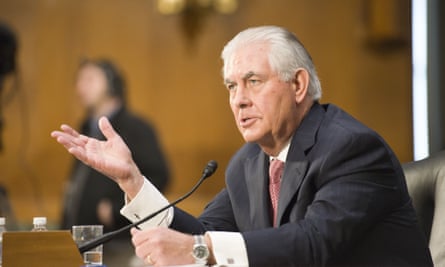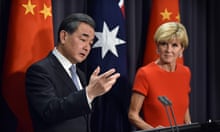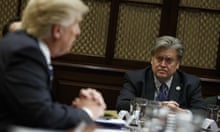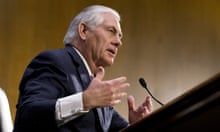Rex Tillerson, Donald Trump’s nominee for secretary of state, has set the stage for a potential clash with China, saying it should be barred from artificial islands it has built in the South China Sea.
Tillerson said China’s control and construction of artificial islands in waters claimed by neighbouring countries was “akin to Russia’s taking of Crimea”.
China claims sovereignty over almost the entire South China Sea, building seven artificial islands on reefs and rocks and outfitting them with military-length airstrips and anti-aircraft guns.
“We’re going to have to send China a clear signal that, first, the island-building stops and, second, your access to those islands also is not going to be allowed,” Tillerson said during his confirmation hearing to become America’s top diplomat. “They are taking territory or control or declaring control of territories that are not rightfully China’s.”
The statements are sure to worry China, which has taken an extremely rigid stance on challenges to its sovereignty claims. Last year, an international tribunal ruled much of China’s territorial claims were invalid, but had little effect and the Chinese government ignored the verdict.
“[Chinese president] Xi Jinping will not be seen as weak and soft in the face of pressure from the United States, so I really do worry about an early crisis with China,” said Bonnie Glaser senior adviser for Asia at the Center for Strategic and International Studies. “China is not going to allow the United States to deny it access to what it sees as its own territory.”
Nevertheless, in its first response to Tillerson’s comments, China’s foreign ministry stressed the importance of mutual respect and cooperation with the US. China-US relations are based on “non-confrontation, non-conflict, mutual benefit and win-win cooperation,” spokesman Lu Kang Lu said at a daily briefing.
The “situation has cooled down [in the South China Sea], and we hope non-regional countries can respect this consensus that is in the fundamental interest of the whole world,” Lu said.
His comments presented China’s control over the area as a forgone conclusion, and indeed it would be difficult for the US to change the facts on the ground without a military confrontation. Experts say China is waiting until Trump assumes the presidency and begins shaping policy before reacting too forcefully.

“China has been restrained in the face of all the tweets and rhetoric because they hope they can put the US-China relationship on an even keel,” Glaser said. “The Chinese have not given up on that, but at some point Xi Jinping may have to because being seen as weak would damage his ability to consolidate power.”
This year is crucial for Xi as his first term winds down. A critical Communist party meeting at the end of the year will involve a cabinet shuffle and will likely determine who succeeds Xi, with leaders locked in a power struggle to appoint their allies.
While Tillerson did not elaborate on how the US would bar China from islands in the South China Sea, experts agreed it would have to involve some form of military deployment.
“Blocking China’s access, presumably with US warships, would precipitate a crisis, a military clash,” said Ashley Townshend, a fellow at the University of Sydney’s United States studies centre.
“It is also illegal under the same rules the US is conducting all of its current policy in the South China Sea.”
Under Barack Obama, the US maintained a neutral stance on sovereignty claims, not recognising any ownership and often sailing warships through the South China Sea in what it called freedom of navigation exercises.
“Tillerson, like Trump, is shaping up to taking a much more hawkish stance with China on the South China Sea and indeed more broadly,” Townshend added.
But a more assertive stance on what China sees as its territorial integrity is likely to cause more tension, with Xi saying in a speech last year: “No foreign country should expect us to swallow the bitter fruit of damage to our sovereignty, security and development interests.”
Tillerson also slammed China for failing to reign in North Korea’s nuclear program, describing China as having “complete control over what sustains the government of North Korea.”
“We cannot continue to accept empty promises, like the ones China has made made to pressure North Korea to reform only to shy away from enforcement,” Tillerson said. “Looking the other way when trust is broken only encourages more bad behavior. It must end.”
The boisterous language on both the South China Sea and North Korea is unlikely to force China to act, and may even hamper efforts of Trump’s administration to encourage cooperation in other areas.
“I can’t think of a solution to the North Korean nuclear issue that doesn’t involve China and the US working together,” Townshend said. “But publicly calling out China is not the best strategy if you are trying to induce them to cooperate.”








Comments (…)
Sign in or create your Guardian account to join the discussion